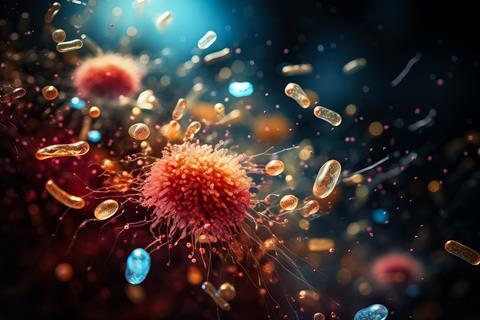A collaborative study has uncovered how metabolites drive communication between gut microbes and human cells to aid intestinal recovery after chemotherapy. This research offers new hope for enhancing cancer treatment outcomes.

In an innovative study published in the journal Cell Host & Microbe, scientists from the Luxembourg Institute of Health, in collaboration with top researchers from the Belgian VIB-Ghent University, the UK University of Edinburgh, and the US Washington University School of Medicine, have unveiled how communication between gut bacteria and mammalian cells hinders intestinal recovery after chemotherapy.
READ MORE: Chemotherapy disrupts gut microbiome in patients with breast cancer
READ MORE: Removing gut bacteria’s potential ‘safe house’ may lower risk of colorectal cancer subtype
This important discovery offers new hope for reducing the harsh gastrointestinal side effects of cancer treatments. Chemotherapy, while effective at killing cancer cells, often causes severe side effects in the digestive system, such as nausea, diarrhoea, and painful inflammation, affecting up to 80% of patients. These side effects are often accompanied by an imbalance in the gut bacteria, known as dysbiosis.
Bacterial imbalance
Whether this bacterial imbalance is just a side effect or a direct cause of intestinal damage has been unclear—until now. In collaboration with Luxembourg Institute of Health Prof Mahesh Desai, Group Leader, Nutrition, Microbiome and Immunity of the Department of Infection and Immunity, the research team led by Dr CJ Anderson (University of Edinburgh) and Prof Kodi Ravichandran (Washington University School of Medicine & VIB-Ghent University) used advanced techniques to study both bacterial genes and how these drugs impact intestinal cells.
They found that when chemotherapy kills cells in the intestines, these dying cells release substances that fuel the growth of harmful bacteria called Enterobacteriaceae. This bacterial overgrowth delays the healing process.
“Our findings show that the death of intestinal cells during chemotherapy releases substances that promote the growth of harmful bacteria, slowing down recovery,” explained Dr Anderson.
Speeding up recovery
Importantly, the study found that preventing the death of these intestinal cells or keeping the harmful bacteria at normal levels can reverse the imbalance and speed up recovery. This suggests that treatments aimed at maintaining a healthy balance of gut bacteria could help reduce chemotherapy side effects.
“Understanding how dying cells and bacteria interact in the gut opens new possibilities for treatments that could improve the quality of life for cancer patients,” said Prof Desai.
This research showcases the power of international collaborations in bringing together multidisciplinary expertise from Europe and the US to tackle a critical issue in cancer treatment. “The scope and scale of this work could not have happened without bringing together such a complementary set of expertise from across the globe,” said Prof Ravichandran.
Dying intestinal cells
The findings not only enhance our understanding of gut health but also point to potential new therapies for managing chemotherapy-induced digestive problems. “Our work now places the dying intestinal cell at the centre of gut health and disease,” said Dr Anderson.
As cancer treatments improve, maintaining a healthy gut becomes increasingly important. The insights from this study about the interaction between human cells and gut bacteria could lead to innovative treatments, offering hope for cancer patients around the world.
This work was a collaboration between the Luxembourg Institute of Health, the Belgian Ghent University, the UK University of Edinburgh, and the US Washington University School of Medicine. A Fulbright visiting scholar from the US to Prof Desai’s research group, Ms. Summer Bushman, contributed to the study.







No comments yet